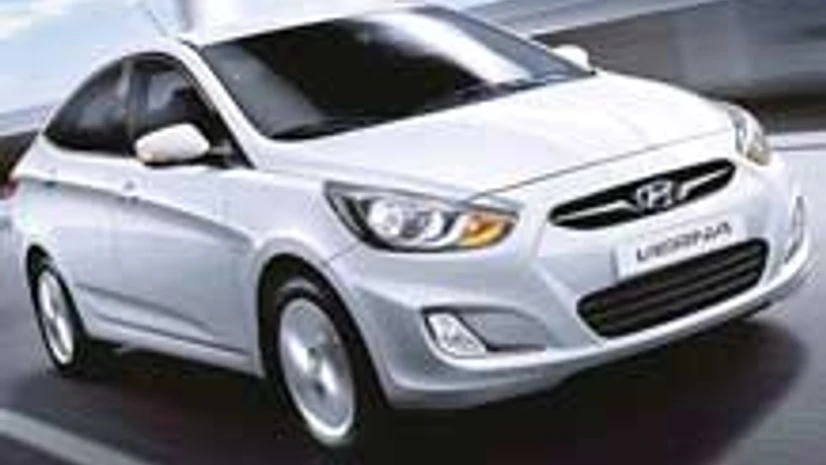Hyundai has been a brand to reckon with in the hatchback segment in India, not letting Maruti Suzuki rest on its laurels. But the sedan market had not taken too kindly to it, even making it withdraw a model earlier. However, India's second-largest car manufacturer can now claim to have usurped Honda City in mid-sized sedans with its Verna.
Albeit, Honda has seen a rise of 20 per cent in April, 2013 (over April, 2012, according to SIAM), riding on the demand for its new super-compact sedan, Amaze. But it has not regained lost ground in the mid-sized sedan segment, which accounted for around 2,00,163 units, last year.
The overall sedan market in India is important for every car-maker as small hatchback owners often upgrade to a super-compact sedan, rather than buy a roomier high-end hatchback. India's love affair with sedans has ensured that compact and mid-sized sedans now comprise a fourth of the 1.89 million car market (according to SIAM, FY-13); mid-sized sedans account for 42 per cent of thatpie.
More From This Section
It now lords over 29 per cent of the mid-sized sedan market. Experts even point out that the Verna's success has rubbed off well on Hyundai's other sedans such as the Elantra.
Fuelling the demand for 58,063 units of the Verna last year had been the clamour for diesel engines in India. Unlike Honda which offers the City only with a petrol engine, Hyundai launched the Verna with four engine combinations, including two diesel engines. The City had held its own against competition without a diesel option for several years in mid-sized sedans, finding new takers every month. However, when petrol costs moved north, consumers gravitated towards diesel-run models. The Honda City's sales stood at 30,530 units last year, a fall of 15 per cent.
The Verna grew by 17 per cent over FY-12. But its growth came despite a year-on-year drop of 2.5 per cent in the entire segment. That is because diesel engines are not the only reason for the Verna's success.
There is a galore of diesel sedans in the market. In Verna's segment itself, other diesel brands have not shown any enviable growth. Ford which launched a new version of the Fiesta last year (priced at Rs 7, 20,000) has been selling less than 500 units a month since then. A revamped Volkswagen Vento failed to lift numbers as it reported a decline of 28 per cent last year, averaging a little over 2,000 units per month.
Observers point out that the Verna's image came into play. Hyundai has kitted the Verna to the brim, unlike many car manufacturers who are found wanting in offering feature-loaded variants to premium Indian buyers. It boasts of no less than 10 trims, including automatic versions, priced from Rs 7,58,000 to Rs 11,90,000 (ex-showroom Mumbai). Analysts say the wide variety has helped pull customers from other sedan segments such as entry and premium.
Naming the new design of the relaunched Verna as 'Fluidic', Hyundai has imparted a distinct sporty and flashy look. Nalin Kapoor, senior general manager (marketing), Hyundai Motor India says, "The 'fluidic sculpture' is Hyundai's new design philosophy, which embodies a flowing and dynamic form. The success of fluidic models is vital as these help to create a 'modern premium' imagery, which aims to provide customers with emotional value." Hyundai's other big cars like the Elantra and Sonata bear the same style stamp. An auto analyst explains, "At the end of the day, many an understated European sedan might look a bit dated, while the Verna meets an innate need for bold designs. It also fosters the perception that the models on offer are the latest, and not from a previous edition."
Hyundai targets hatchback- and sedan-owners in their thirties with the Verna. "The communication was built on aspirations of a futuristic, high-end-looking car that no other manufacturer has been able to capture well. The buyers of the Verna are expected to be style-conscious", reiterates Kapoor. Monthly figures say it all - the City, with its legacy of style and performance averaged 2,544 units per month, while the Verna clocked 4,840 a month last year.
The sales of the Verna has fed the buzz around the re-launched Elantra as well, which had been withdrawn earlier. It has helped Hyundai crack the sedan market beyond the Rs 12,00,000 bracket. The Elantra now outsells Toyota's Corolla in the premium sedan segment, averaging 500-550 units since its launch in August, 2012. Hyundai has strengthened its share in the sedan segment, unlike rival Maruti Suzuki which has seen success in sedans only with the compact Swift Dzire. Thanks to its compact styling (lower taxation and price), the Swift Dzire remains the largest-selling sedan in India, albeit in the super-compact segment.
However, Hyundai will have to brace for newer mid-sized entries, with refurbished sedans from Ford, Fiat and Tata Motors likely to be launched. The Skoda Octavia might re-enter the fray. There is still some time before the biggest threat rears its head - an all-new City - by 2015. Honda will bank not only on spanking new styling but a very fuel-efficient i-DTEC diesel engine too.

)
